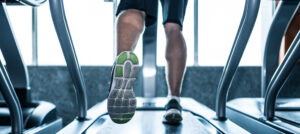Cardiac Stress Test

What is a cardiac stress test?
A myocardial perfusion SPECT (Single Photon Emission Computed Tomography) study, also called a cardiac stress-rest test, is used to evaluate the heart’s blood supply. Two sets of images showing blood flow are obtained: the first following a period of stress (which may involve exercise on a treadmill) and the second following a period of rest.
The technologist will inject a radiotracer into a vein – this is a compound made of a radioactive isotope and pharmaceutical agent. In this procedure, the radioactive isotope releases energy, and a special camera creates an image from it. the pharmaceutical part keeps the tracer in the blood until it is filtered out by the kidneys.
The myocardial perfusion SPECT is used to look at damage that might have been caused by a heart attack (myocardial infarction) and to assess extent of myocardial ischemia (reduced blood flow due to obstruction in the vessels).
Preparation
Do not eat or drink caffeine products (including chocolate, soda, tea, coffee or Excedrin (r)) for 24 hours before the exam. Decaffeinated products still contain some caffeine, so do not eat or drink decaf items either.
Consult your provider about going off beta blockers for 24 hours and calcium channel blockers 24 hours before your exam.
Do not eat or drink for four hours before your appointment – though, drinking water is okay.
If you aren’t able to exercise on the treadmill, a medication will be administered to stress your heart. If you are undergoing this type of exam, you may take all your heart and blood pressure medications as instructed by your provider.
If you have diabetes, please speak to your physician prior to this exam to receive special instructions you may need regarding your medications.
For stress tests, wear comfortable clothes and rubber-soled shoes or sneakers for the treadmill portion of the exam.
Please bring a list of all of your medications (with doses) to your appointment.
During the Test
Approximate visit time or the SPECT is about four hours. You will receive two injections of a small amount of radioactive material. The level of radioactivity used is extremely low and has no side effects. To minimize the number of injections you receive, an IV (intravenous line) will be place din your arm prior to the first injections and will be re-used later for your second injection.
Our trained staff will place EKG leads on your chest. The EKG will be used to constantly monitor your heart during the stress test.
Your heart will be stressed, either through exercise or through the use of medication. During this test, you will be constantly monitored by a Physician.
The actual stress portion of the SPECT takes about 10 to 15 minutes, however, the preparation takes longer – up to 30 minutes.
Before the end of the stress test, an injection of a radioactive material will be administered. This radiopharmaceutical is taken up by your heart muscle and can by visualized by the gamme camera. Following your first injection, you will be placed under a gamma camera and pictures of your heart will by recorded. This camera does not produce any radiation. It will be placed closed to your chest and pictures will be taken for approximately 20 minutes. THis portion of the test is called the stress study.
Three hours after your stress injection, you will be asked to return for Rest images. You will receive a second injection of the radioactive material. 20 minutes later, images will be repeated.
Expectations
Normal responses during testing include feeling tired, shortness of breath, and sweating. You should tell the technician or physician if you feel any of the following:
- chest, arm or jaw discomfort
- severe shortness of breath
- extreme tiredness
- dizziness
- lightheadedness
- leg cramps or soreness
The test will be changed or stopped if it is unsafe for you to continue.
Afterwards
When the first part of the test is over, you can eat or drink and return to your normal routine. You can resume all of your medications as well.
Your test will be reviewed by our Radiologist and results will be sent to your physician. Your provider will discuss these results with you and explain how they relate to your health.
To get a copy of your report, call 203-732-7204.